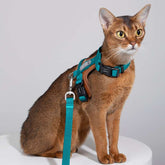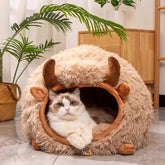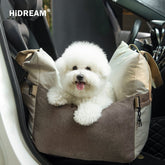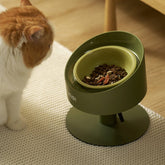How To Choose The Best Litter Box For Your Cat

As a cat owner, providing your feline friends with a suitable litter box is crucial. Different cats have different preferences, and there's a wide variety to choose from on the market.
Your personal needs also play a part in this decision. Factors like your living situation, daily routine, and aesthetic preferences will influence your choice of cat litter box. So, how do you choose the best one for your cat? Refer to this guide to learn more.
Factors to Consider When Choosing a Cat Litter Box
To select the most suitable litter box for your cat and your home, consider the following aspects:
Cat's Size
The size of your cat significantly influences the litter box you choose, as they come in various sizes and shapes. The box should be spacious enough for your cat to turn around inside. It should also be tall enough to prevent litter scattering when the cat digs. If not, you’ll need a mat or to clean regularly to prevent litter from spreading around your house.
Different cat breeds require different litter box sizes. Ideally, the box should be about one-and-a-half times larger than the cat, with dimensions similar to your cat's size.
Open or Closed Litter Box?
Two main factors should guide your decision. Firstly, cats instinctively look out for danger and need an escape route. Some may be hesitant to use a closed litter box as it obstructs their view of their surroundings. In a house with other pets, a closed litter box could even be an ambush spot.
Secondly, a closed box can contain odors and keep litter inside, but if the smell becomes too strong, your cat might avoid using it. If maintenance is a concern, an open litter box could be a practical solution for both you and your cat.
However, while closed litter boxes may be suitable for some cat owners, they might not be ideal for larger cat breeds such as Maine Coon, Savannah, Siberian, or Ragdoll. These cats may not fit well and could create a mess.
Cat's Age
Younger cats can manage top entrances and higher sides, while older cats need a box they can enter and exit without much effort. That's why a litter box with low front and back entries is ideal for older cats. Boxes with higher sides are great for senior cats, allowing them to sit down properly without straining their backs. Younger and healthier cats rarely have these issues.
Litter Box Budget
Cat litter boxes are available in stores and online at various price points, starting as low as $10. However, if you opt for cheaper plastic litter boxes, you might have to replace them frequently due to scratches and dings that could trap dirt and odors, making the box unappealing to your pet. One solution is to trim your cat's nails to minimize scratches on the litter tray, thereby extending its lifespan.

Types of cat litter boxes
Open Litter Boxes
Open cat litter boxes are an economical and efficient choice, making them perfect for cat owners with multiple feline companions. They are favored by cats that appreciate a wide view and the ability to keep an eye out for any potential threats. One of the biggest advantages of open cat litter boxes is their simplicity and affordability, which make them an easy choice for budget-conscious owners.
Cleaning and replacing litter in these boxes is straightforward, and their generally compact size makes them more portable than other types. Additionally, open boxes offer ample space, accommodating large cats comfortably. Furthermore, cats require little to no training to use these boxes, making them a convenient choice for both the pet and the owner.
However, these boxes do come with their own set of drawbacks. There's a high probability of cats scattering litter all over the place due to the box's open design. The absence of a lid or cover also means that odor control is a constant challenge, necessitating regular cleaning. Finally, the open design means everything inside the box is visible, potentially detracting from the overall aesthetic of your space.
Closed Litter Boxes
For apartment-dwelling cat owners, litter box odor can be a major concern. A solution to this issue can be choosing a closed cat litter box. These boxes not only provide privacy for cats but also contain odors and prevent litter from scattering around the house. They tend to be more aesthetically pleasing and can be placed anywhere in your home.
However, they do come with certain drawbacks. For instance, they can be challenging to clean unless the cover is removed, emphasizing the importance of the box's design. They are also typically heavier and bulkier, taking up more space. Plus, some cats, particularly kittens, might need training to use them correctly.
Self-Cleaning Litter Boxes
Self-cleaning litter boxes are an ideal solution for those with busy schedules and limited time for chores. These boxes function by raking and sifting through the cat litter, collecting waste in a compact bin which can be easily emptied. One of the key advantages of self-cleaning litter boxes is their ability to save time for busy individuals, as they are designed to clean themselves. Additionally, they drastically reduce litter odor, removing the need for regular cleaning and scooping.
However, these boxes also have some drawbacks. In comparison to other litter boxes, self-cleaning versions tend to be quite expensive. They also require a significant amount of care to prevent the rakes from causing harm to your cat. If the rakes fail to remove all the waste properly, more clumps are likely to accumulate. Another consideration is that these boxes require a power source to function, which may not be convenient for all users. Lastly, these types of boxes may also limit the types of litter that can be used.
Extra-Large Litter Boxes
Extra-large litter boxes are perfect for those with large or multiple cats. They come in both open and closed styles but are generally larger and deeper than standard litter boxes.
One of the main advantages of these large boxes is their convenience in cleaning and refilling. They accommodate a larger amount of litter, which means less frequent replacement. Plus, they help prevent messes from large cats, making them a practical option for households with larger breeds.
However, these boxes also have some drawbacks. Their extra-large size can take up more space, which may not be suitable for smaller homes. They also require more litter to fill, which could increase the expense for the cat owner and make the box too heavy to move around.
Top entry litter boxes
If you're tired of your cat spreading litter all around the house, a top-entry litter box might be the perfect solution. This type of litter box is designed with a removable cover that has a hole at the top, serving as the entry and exit point for the cat. One of the significant advantages of this design is its innovation, keeping the unique behaviors of cats in mind. It also minimizes the chances of your cat scattering litter on the floor. Additionally, it effectively contains odors within the box, preventing them from spreading throughout your home. However, this design has a few drawbacks. It may not be suitable for kittens, older or larger cats, as they might struggle to get in and out of the box due to the top-entry design.

Designer Litter Boxes
If you live in a city, you might want a litter box that blends with your apartment's aesthetics. A designer litter box is an ideal choice as it adds a touch of style to your home.
One of the primary advantages of a designer litter box is its attractiveness compared to an ordinary litter box. It enhances the overall appearance of your living space, which is especially beneficial for those living in smaller apartments where the litter box might be in view. Another advantage is that designer litter boxes are often better in terms of functionality. Designers put a lot of thought into their products, ensuring that they are user-friendly for both the cat and the owner.
However, there are a couple of downsides to consider as well. Designer litter boxes are typically more expensive than standard litter boxes. This could be a significant drawback for those on a tight budget. Additionally, designer litter boxes can be harder to find. Unlike standard litter boxes, you might not find designer ones in every pet store, and might have to do some searching online or in specialty stores.
How often should you scoop and clean your litter box?
Cats uphold high cleanliness standards and are more inclined to use a clean litter box. Neglecting the maintenance of the litter box can lead to behavioral problems, such as cats urinating on beds and elsewhere in the house. Below is a cleaning schedule guideline to keep your cat content.
-
Scoop all solid waste daily, ideally one or two times
-
Replace / refil the litter with a fresh batch weekly
-
Thoroughly clean the litter box at least once a month to eliminate dirt and germs
-
Replace the litter box every 6 months to 1 year if it becomes too scratched or stained.

In conclusion, selecting the ideal litter box for your cat involves considering factors such as your cat's size, age, and preferences, as well as your needs and budget. Higooga offers a wide range of options to accommodate your lifestyle and your cat's needs. Maintaining a clean and fresh litter box is essential for your pet's comfort and hygiene. With careful research and understanding, you can find the perfect litter box that satisfies both you and your feline friend.























